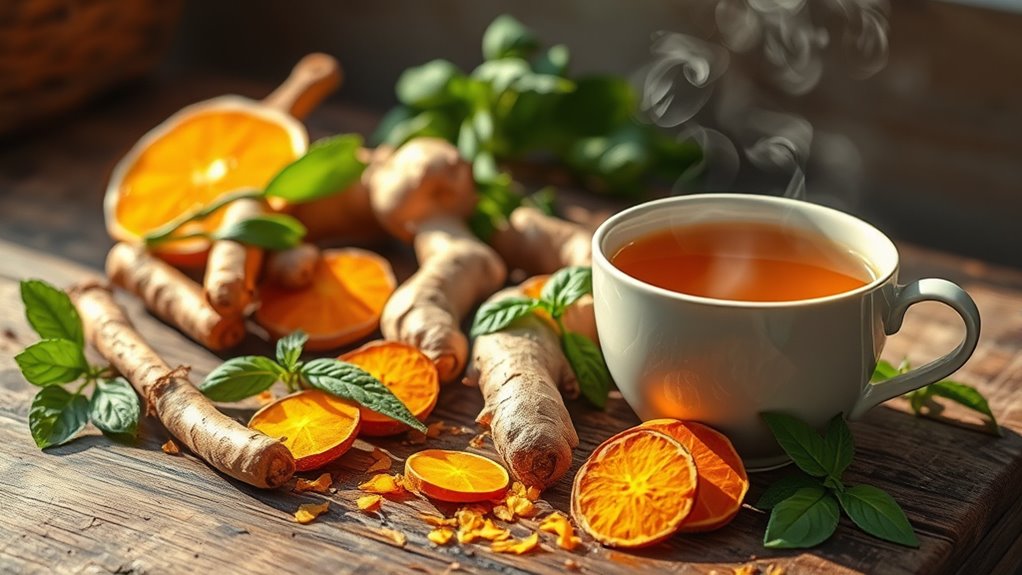Incorporating anti-inflammatory herbs like turmeric, ginger, and holy basil can help reduce systemic inflammation that influences your mood. By fighting inflammation, these herbs may lift your spirits and lessen symptoms of anxiety or depression naturally. They support brain chemistry and emotional resilience without synthetic medications. If you want to explore how these herbs work and other strategies to boost your mental well-being, there’s more to discover that could make a real difference.
Key Takeaways
- Certain herbs like turmeric, ginger, and saffron possess anti-inflammatory properties that may help improve mood.
- Anti-inflammatory herbs can reduce systemic inflammation linked to depression and anxiety.
- Incorporating herbs into the diet may support brain health and emotional well-being.
- Some herbs also have antioxidant effects, protecting brain cells from inflammation-induced damage.
- Consulting a healthcare professional is recommended before using herbs for mental health support.

Recent research shows that inflammation in the body is closely linked to mental health issues such as depression and anxiety. When your body experiences chronic inflammation, it can influence brain chemistry, leading to mood swings, feelings of hopelessness, or persistent anxiety. Understanding this connection opens the door to exploring how nutritional strategies and lifestyle modifications can help reduce inflammation and potentially lift your mood.
Chronic inflammation impacts brain chemistry, contributing to depression and anxiety—addressing it can improve mental health naturally.
One effective way to combat inflammation is through your diet. Incorporating anti-inflammatory foods—such as fatty fish rich in omega-3 fatty acids, berries loaded with antioxidants, leafy greens, and nuts—can help decrease inflammatory markers. These nutritional strategies support your body’s natural defenses and contribute to better mental health. Avoiding processed foods, excessive sugar, and trans fats is equally important, as these can promote inflammation and worsen mood symptoms. By making mindful food choices, you actively reduce systemic inflammation and foster a more balanced mental state.
Beyond diet, lifestyle modifications play a essential role in managing inflammation. Regular physical activity, for example, is proven to lower inflammatory levels and boost mood by releasing endorphins. Even moderate exercise like walking or yoga can make a significant difference. Ensuring adequate sleep is another important factor; poor sleep increases inflammation and exacerbates anxiety and depression. Developing a consistent sleep routine helps regulate your body’s inflammatory response and improves overall mental clarity.
Stress management is equally significant. Chronic stress triggers inflammatory processes, which can impair brain function and worsen mental health issues. Incorporating relaxation techniques such as meditation, deep breathing exercises, or mindfulness can help you manage stress more effectively. These practices not only reduce inflammation but also improve your emotional resilience.
In addition, reducing exposure to environmental toxins—like pollution or cigarette smoke—can lower inflammation levels. Quitting smoking and minimizing your contact with pollutants support your body’s efforts to stay inflammation-free. Staying socially connected and engaging in activities that bring you joy also influence inflammation positively, as loneliness and social isolation have been linked to increased inflammatory responses. Moreover, understanding the link between home theatre projectors and overall well-being reminds us of the importance of creating relaxing environments that can reduce stress and support mental health.
Frequently Asked Questions
Can Anti-Inflammatory Herbs Replace Prescribed Antidepressants?
You wonder if anti-inflammatory herbs can replace prescribed antidepressants. While herbal alternatives may support mood and reduce inflammation, they shouldn’t be viewed as direct medication comparisons. You need to understand that herbs can complement treatment but aren’t a guaranteed substitute for medications prescribed by your doctor. Always consult your healthcare provider before making changes, as they can guide you safely and effectively based on your specific mental health needs.
How Quickly Can Herbal Remedies Impact Mental Health Symptoms?
Ever wonder how fast herbal remedies can help with your mental health? The herbal onset varies, but some people notice symptom relief within a few days to a couple of weeks. While herbs might not replace medication for everyone, they can support your mood gradually. Are you willing to give natural options a try and see if they bring relief faster than you expect? Patience and consistency are key.
Are There Any Risks or Side Effects Associated With These Herbs?
When considering anti-inflammatory herbs, you should be aware of potential risks like herb interactions and dosage considerations. These herbs can interact with medications or cause side effects if taken improperly. Always follow recommended dosages and consult with a healthcare professional before adding new herbs to your routine. Staying informed helps you avoid adverse effects and guarantees safe, effective use of these natural remedies for your health.
Which Specific Herbs Are Most Effective for Mood Improvement?
Oh, sure, just pick any herb and expect instant happiness. But you’ll want to take into account traditional uses and herbal dosage for real results. Herbs like St. John’s Wort, known for mood support, are effective when taken properly. Rhodiola and Ashwagandha also boost resilience and reduce stress. Remember, consistency and correct dosage matter more than magic potions—so choose wisely, and don’t forget to follow proper guidelines.
Can Inflammation Reduction Improve Mental Health in Chronic Illness Patients?
Reducing inflammation can markedly improve mental health in chronic illness patients because of the gut-brain connection. When inflammation decreases, your gut health improves, which in turn boosts your mood and cognitive function. By managing inflammation effectively, you support your overall well-being and potentially lessen mental health symptoms linked to chronic conditions. This approach helps you feel more balanced, resilient, and better equipped to handle the challenges of chronic illness management.
Conclusion
Research shows that chronic inflammation affects up to 40% of people with depression, highlighting its significant role in mental health. Incorporating anti-inflammatory herbs like turmeric or ginger into your diet might help reduce inflammation and improve your mood naturally. While more studies are needed, embracing these herbs offers a simple, accessible way to support your mental well-being. Remember, small dietary changes can make a big difference in how you feel, so consider adding these powerful herbs to your routine.










